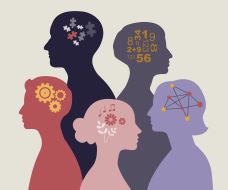Neurodiversity
Page updated: 15/04/2024
What is Neurodiversity?
“At the heart of neurodiversity is the idea that individual differences are not weaknesses, but that society imposes expectations based on a majority neurotypical population. When not met, this can lead to challenges.” Royal College of Nursing.
“We are all Neurodiverse but we’re not all Neurodivergent.” Dyslexia UK.
The word neurodiversity refers to the “diversity of all people, but it is often used in the context of autism spectrum disorder (ASD), as well as other neurological or developmental conditions such as ADHD or learning disabilities.”
The neurodiversity 'movement' stresses the importance of enabling people with neurologically different minds to be accepted for themselves, by discovering and celebrating their strengths and for society to value their differences. People experience and interact with the world around them in many different ways; there is no one "right" way of thinking, learning, and behaving.
Although everyone has different processes for dealing with work and everyday situations, it is worth noting that people who are neurodiverse struggle with a lot of daily life that most neurotypical people would be able to deal with more easily. Therefore education, adjustments and understanding about neurodiversity is necessary in order to make daily working life for a neurodiverse person more accessible and comfortable.
All of the information is targeted solely at adults with neurodiversity. Also, all the information given will not give a diagnosis only help you to understand more about neurodiversity. Completing online tests does not mean you have a condition –physical, mental or neurodiverse. If you suspect you are neurodivergent, then speak to your GP
Health & Wellbeing
Meet the Team
Mental Health First Aid
- The Role of a Mental Health First Aider
- Information for Applicants
- Information for Managers
- Frequently Asked Questions
- Your Mental Health First Aiders
Health & Wellbeing Champions
- The Role of a Health & Wellbeing Champion
- Information for Applicants
- Information for Managers
- Frequently Asked Questions
- Your Health & Wellbeing Champions
Lifestyle Advice
Financial Advice
Stress, Mental Health and Emotional Wellbeing
- Stress
- Individual Stress Assessment
- Mental Health
- Avoiding Burnout
- Building Personal Resilience
- Dealing with Trauma and Bereavement
- Combatting Loneliness
- Resources and Support
Back and Joint Pain
More from Health & Wellbeing


